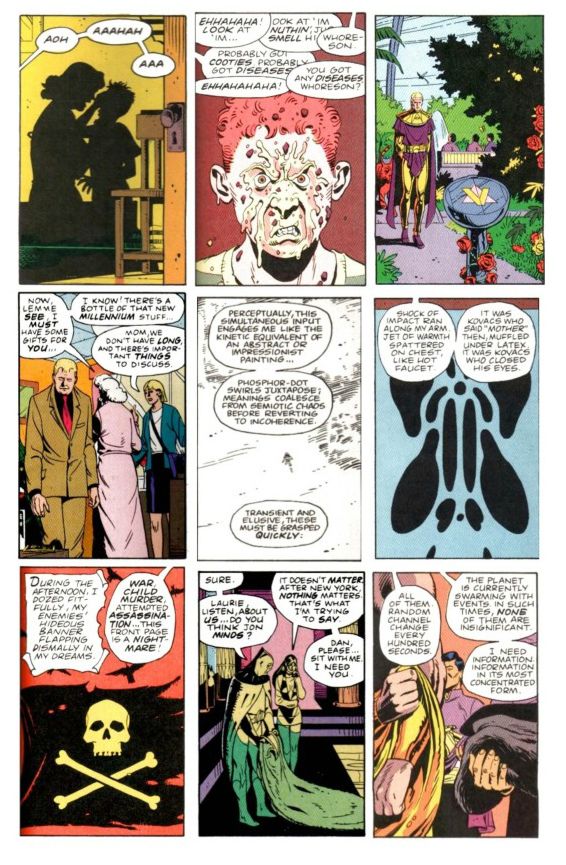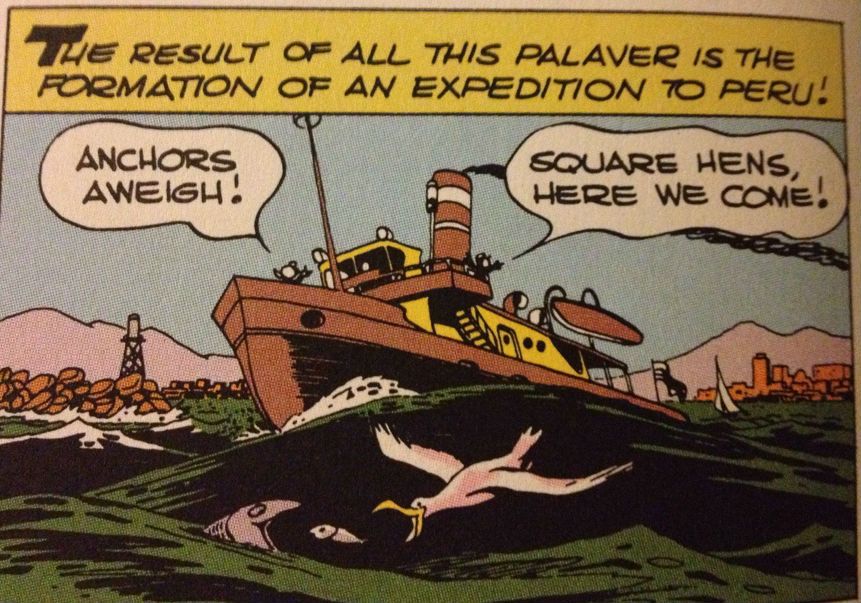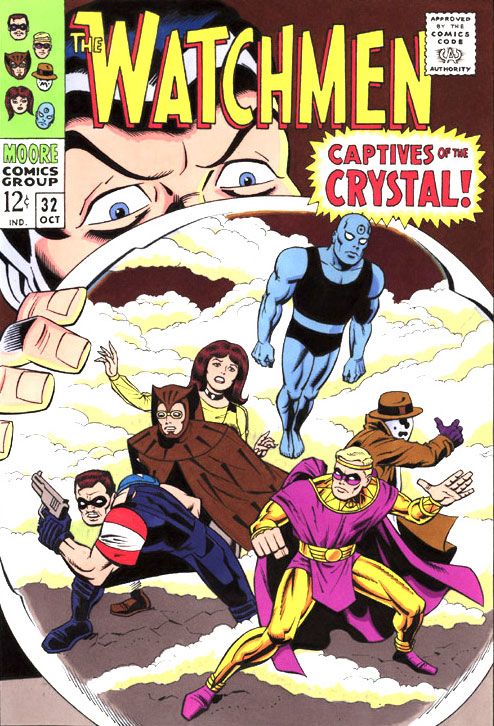 We're a week or so from the real release of the WATCHMEN film. I've seen it. This is INCREDIBLY FUCKINGLY SPOILERY, so you must absolutely NOT read it if you don't want your watching experience potentially ruined.
We're a week or so from the real release of the WATCHMEN film. I've seen it. This is INCREDIBLY FUCKINGLY SPOILERY, so you must absolutely NOT read it if you don't want your watching experience potentially ruined.
Seriously, I almost felt I should hold it until actual release. So don't go below the jump unless you understand the ramifications of your actions.
Friday night... well, no Saturday morning, there was a IMAX screening of WATCHMEN, at WonderCon, roughly a week before the film is generally released.
They decided to be clever by having it at 11:55 PM (five minutes to midnight being a theme in the book, y'see), but, of course, with the various multiple levels of security to get in, and the desire to fill each and every seat in the place ("Who has an empty seat next to them, please raise your hand. No, only one person raise their hand") it didn't start until, ugh 12:30 or so.
Dave Gibbons gave a quick intro which was worth the price (or time) of admission by itself, kinda -- who doesn't want to watch WATCHMEN without Dave Gibbons standing there with you?
I managed to stay awake pretty much through the entire thing (though I started to nod off a little in the prison break sequences -- but I caught myself, and adjusted my seating until it was uncomfortable, so I could stay awake) -- we finally got out at like 3:30 am, ugh.
So, here's a review:
Overall, I did not like it.
It's utterly slavish to the comic in places -- amazingly astonishingly incredibly faithful. Then, in the same scene, completely absolutely and totally unfaithful. Obviously I get why having Rorschach vs The Psychiatrist being a single scene (instead of the 3-4 in the original) "needs" to be done for time reasons, but I don't understand why having, say, Dan and R's first encounter doesn't have R stealing all of his sugar so he can eat it through the rest of the film: that doesn't take any screen time, it is just incidental character movement that can happen while delivering dialogue. It isn't like you need, or want, to cut to a tight shot of him doing it.
All in all, the film is the Reader's Digest version: if it can plausibly be cut, it probably is. For example: the news vendor and The Kid are in the film, but they don't have a single line of dialogue. The Intersection is there, but nothing occurs on that spot. All in all I'd guess that roughly half the book makes it to the screen.
Its weird because I wish the film was actually worse, so I could honestly HATE it -- I walked out feeling totally disappointed, but not in a "stay the fuck away!" sense.
And it made me want to see the 6 hour version (that doesn't exist), kind of, but also afraid that would be just as wrong.
I was distracted by:
Rorschach's moving mask. It was distracting, and didn't really look right to me, with everything focused purely on the face (it goes around his entire head, after all) I also thought the "texture" of the mask was wrong.
Jon's massive cock. It is pretty big, alright, and you notice it in every scene it is in.
The Two Silk Spectres, anytime they had a scene together. Mom looked younger than the daughter, damn it! And neither of them was particularly a good actress.
The stupid scaled-up super-heroic nonsense. I'm not talking about the slow-mo jumping scenes in the trailer, actually most of those are out of context, and in the film they look pretty decent -- but things like The Comedian punching through solid concrete. With bare hands. When he's 70 and about to die. Everytime a non-Jon, non-Adrian character did super-heroey things, I wanted to die inside.
Dan's lack of those owl-wings hairs in the front. That's like Superman not having the spit-curl "S"!
The not beginning and ending the movie with the same image, damn it. Those images are there, but a few minutes to either side, weird!
But, really, the biggest problem with the film is I feel like they Didn't Get It, for several reasons. Namely:
1) It fetishized the violence. This is a seriously violent movie. Most of that violence is in the comic, but it is very very different in a comic than in a movie -- especially when the movie tends to use that speed-up, then slow-mo down technique for the action. Movies also have sound effects (you can hear shit breaking and tearing, yes), which the comic resolutely did not have.
2) It fetishized the heroes. Jon is built nearly like Ah-nold (and/or John Holmes, depending on the angle). Dan doesn't look like a broke-down middle-aged man. Everyone has Batman-Style fake muscles and all that. Only Rorschach fit my idea of being what he should be: being nearly-shockingly puny in size compared to the others.
3) Most of the "world building" is thrown out the window -- cigarettes aren't any different (not that we see ANY in the world, but still), nor do there appear to be cheap electric cars or any of that. OK, there's still a Gunga Diner, I guess, OK.
4) Dan and Laurie are explicitly still super-heroes at the end -- they even talk about taking Archie out. Yikes, NO.
5) The Final threat isn't the giant squid attacking New York for that 9/11 moment, but "'Dr. Manhattan' attacks the WORLD", yet only with Tricky Dick leading the change. Like, OK, lets assume Jon does go nuts and kill people... what the fuck could you POSSIBLY do to band together to stop him? That works even less as an ending, thematically. Esp. when Dan has that dumb fucking ass line about "We'll be OK as long as everything thinks Jon is still watching" or whatever.
No, no, no, and no. Have you ever READ the book, guys?
Here's what gets me: this is very much a perfect adaptation of WATCHMEN in several ways -- there are places where you're going to go "Ooh, NAILED it", but they go far enough from theme and incident that the human-ness in the story is a distant second to the spectacle and a literal read of the plot.
As I've said: no one reveres WATCHMEN for its plot -- it is its construction and characterization* that we marvel at.
I hope this does well enough that another 10 million people will seek out the book, I can tell you that, but I also sorta hope it doesn't make back its production costs, because hacking out a WATCHMEN II is actually almost possible with the new ending.
At the end of the day, I might say this was much like the film version of V FOR VENDETTA -- it entertained me reasonably well in the moment of watching it, but I walked out of the theater thinking they had misunderstood the fundamental philosophic underpinnings of the original work.
That opening sequence of "the times they are are a-changin'" with the semi-moving photos and the history of the world really made me think that maybe they made a version of WATCHMEN that while not-the-comic, was also pretty good -- that's a nice opening. But as the film went on and on, I thought it had less and less heart, and I was pretty disgustipated by the end of the film. On the Critic Scale, I'd absolutely call the overall thing an EH.
I can also say this: there's no reason that I could see to really see it on IMAX. Should be just fine on a normal-sized screen. This isn't like THE DARK KNIGHT, where there were IMAX-filmed scenes that demand that viewing. In fact, maybe just maybe that added to my sense of "Why all the spectacle?" because the shit was 100 feet high. I honestly might have liked this better on a television screen, really.
So, when you see it, what did YOU think?
-B
* = (Yes, Mr. Lester, that's more exact)
















